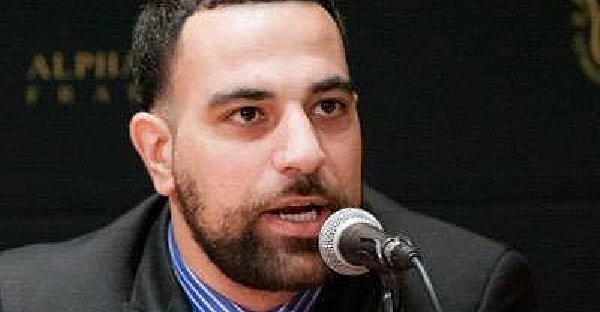Janine Jackson interviewed the U.S. Campaign for Palestinian Rights‘ Ahmad Abuznaid about the Rafah invasion for the May 10, 2024, episode of CounterSpin. This is a lightly edited transcript.
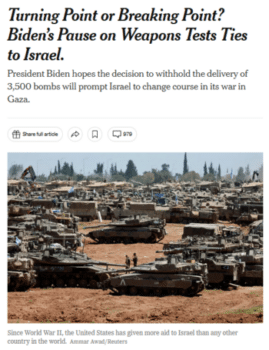
New York Times (5/8/24)
Janine Jackson: Beltway reporters have access to things others can’t see, but can they see things that aren’t there? That question was brought to mind by a May 8 piece by New York Times chief White House reporter Peter Baker, in which he interpreted Biden’s evident decision to “pause” delivery of certain types of bombs to Israel as “meant to convey a powerful signal that his patience has limits.”
Israel’s plans to storm the southern Gaza city of Rafah, Baker explains, “have been a source of intense friction with the Biden administration for months.” That friction was evidently expressed in the unfettered delivery of weapons during those months, and the publicly expressed support for the catastrophic violence that has killed, maimed, orphaned and displaced millions of Palestinians, destroyed their homes and infrastructure, and denied their access to humanitarian aid.
Others, more focused on actions than vibes, saw this step as “overdue but necessary,” if it is part of some serious effort to condition any U.S. support for Israel on ending the bloodshed.
Ahmad Abuznaid is executive director at the US Campaign for Palestinian Rights. He joins us now by phone from DC. Welcome back to CounterSpin, Ahmad Abuznaid.
Ahmad Abuznaid: Thank you, Janine. Thanks for having me.
JJ: An invasion of Rafah, we were told, would be an uncrossable “red line” for Biden, but luckily enough, a New York Times headline says, “Attack Not Seen as Full Invasion”—“seen as” being the kind of slippery language media use to suggest something they’d rather not say: that only some people’s definitions matter. What do we know about what’s happening in Rafah right now? Is it surprising, and why would we accept that it doesn’t amount to invasion?
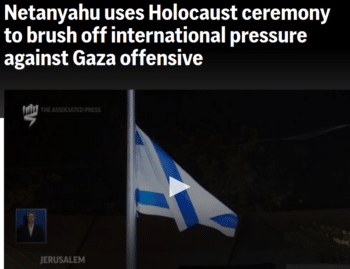
AP (5/5/24)
AA: Well, we shouldn’t accept that assessment. Israelis have been saying they’re going to invade Rafah, no matter what. They said they would continue with their “mission,” no matter what. Benjamin Netanyahu just gave a speech and said, despite any pressures or response from outside forces or international forums, Israel will continue.
So I think what’s really the question here is whether President Biden issued his red line in actual red or in pencil. We’re going to find out, because technicalities as to how they view the invasion of Rafah aside, not only has it already occurred, but they’ve clearly made the statement again that they’re going to continue. So I think, really, the ball is in President Biden’s court. Will he continue to be bullied around and told what to do by Netanyahu, or will he act like he’s the president of the U.S., and call for an end?
JJ: Is the pause, as it’s been called—some people have been saying he stopped giving weapons; that’s not it. It’s been called a pause or a delay in the delivery of certain types of bombs. Is that meaningful? How meaningful is that?
AA: No, that’s not meaningful. And I’ll tell you why. Because in the last few months, there has been shipment after shipment after shipment to Israel. And so to now say that you would pause, or have paused, certain munitions is a little too little, too late. Israel may not, in fact, need what you paused in order to, again, conduct its invasion of Rafah.
So are you going to end the genocide, President Biden? That’s the central question. People aren’t asking for a pause right now. They’re asking for an end to the genocide, and an end to military weaponry to Israel. So it’s clear President Biden is still not reading the room.
JJ: Yeah, yeah. In general, it feels as though the options or the hopes are so tamped down. Ceasefire seems like the ultimate thing that we can call for, but ceasefire doesn’t bring people back to life. It doesn’t put Gazans back in their destroyed homes. I mean, obviously, cease fire, but where would that fit in with what else needs to happen?
AA: Yeah, I mean, the ceasefire is the most immediate demand, and that’s why if President Biden had made this threat via weapons months ago, there literally may have been thousands of lives saved. And so the ceasefire is still the first and most urgent demand, because we’re trying to save lives.
The people of Rafah are not only facing, again, the incredibly brutal and violent genocidal assaults, they’re also facing forced starvation. There was this huge conversation around aid trucks beginning to increase, and now here we are again with aid trucks essentially coming to a halt. So the genocide is real, and that’s the first and most important demand in this moment.
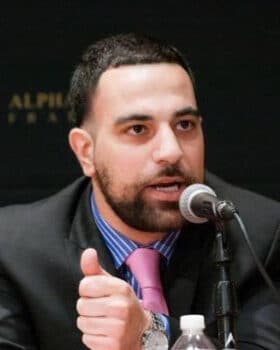
Ahmad Abuznaid: “We need to stop the bloodshed, stop the starvation, stop the siege. But beyond that, we need to make sure this can never happen again.”
But beyond that, after what the U.S. taxpayer, after what the West, after what elected officials have witnessed, how can they continue to go back to the status quo of supporting the state of Israel, even if there’s a ceasefire? I would argue that it’s clear to most Americans at this point that the Israeli government cannot be trusted with our weapons. They’ve taken it so far at this point, with their genocidal conduct, there’s actually no turning back.
And so ceasefire fits in, again, prominently, because we need to stop the bloodshed, stop the starvation, stop the siege. But beyond that, we need to make sure this can never happen again, and to make sure this can never happen again, that means that the state of Israel must not receive any more U.S. arms, period. The U.S. should no longer protect Israel at the International Criminal Court, period. The U.S. should no longer protect the state of Israel at the International Court of Justice, period.
These are all ways that Israel deserves to be isolated in this moment. And, in fact, many countries are already taking that necessary step. We’ve seen Colombia, for instance, cease any relations with the state of Israel, and that’s what’s required of the world right now, especially of the United States, a country that proclaims itself to be one of those leaders of the “free world,” and supportive of people’s self-determination and calls for freedom and justice. If the U.S. is truly that, this is the moment to show it.
And so we’re way beyond the ceasefire. We need a ceasefire immediately, but we need to see some divestment from the Israeli apartheid state, divestment from the genocidal state, and sanctions on the genocidal apartheid state.
JJ: There’s a feeling that the masks are off. Legislators in this country aren’t saying, as they supply Israel with money and bombs and political shielding and international bodies, they aren’t saying, “We hope for peace, but it’s hard. And Israel is our friend.” They’re now saying, “If you don’t full-throatedly support Israel’s ethnic cleansing project, you’re a terrorist supporter, which by the way means you’re a terrorist, and we will see that you are treated accordingly.”
That sentiment has always been there, of course, but it’s still shocking what people are now OK saying out loud–and doing, like HR6408, legislation to define pro-Palestinian groups as terrorist-supporting, and strip their tax exempt status. How are groups like U.S. Campaign for Palestinian Rights responding to these very overt and meaningful legislative threats?
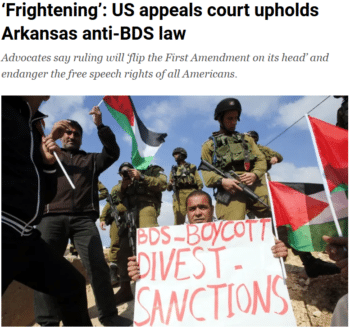
Al Jazeera (6/22/22)
AA: Look, they’ve attempted to stifle BDS and criminalize boycotting of Israel. They’ve attempted to make people pay via loss of state-awarded contracts, and agreements, right? You would sign this pledge. We’ve seen, of course, lawsuits and lawfare utilized, such as the lawsuit that was levied against the U.S. Campaign. And you know what? We fought that and we won.
And so this is actually another overreach, another violation of our constitutional rights, another mode of repression against Palestinian organizing and activism. But the fact of the matter is, this isn’t going to stop us. If they think that a piece of legislation like this is going to cause us to cease our advocacy, our activities, our organizing, our shutting it down for Palestine, then they’ve miscalculated. So what we’ll see is that this will be utilized by the state to attempt to repress and suppress the movement, just like the anti-BDS laws, just like these lawfare expeditions.
But it won’t stop. They won’t silence us, they won’t stop us, and if, at the end of the day, we have to suffer through losing tax-exempt status, I think the organizations that right now are doing anything they can to stop a genocide, I think they’ll gladly sacrifice tax-exempt status. But I hope it doesn’t come to that, because it’s clearly a violation of our First Amendment rights, and our constitutional rights to organize in this country.
JJ: It seems like something has fundamentally changed in terms of the U.S. public, and of course we’re seeing it with college students, but it’s been there before. It feels like flailing on the part of the administration, and on the part of people who want an uncritical support for anything that Israel does, and want support for genocide. The students are just driving them mad. And yet there they are, still doing it. Does this feel like a shift to you? I know you’re not a psychic, but does it seem like something is changing?
AA: Oh, it’s absolutely changing. Millions of people have taken action in the last few months, and that’s been calls, letters, petitions, direct action, civil disobedience, marches, protests, rallies, birddogging, you name it. And now we see encampment, and the students, just like they rose up against the war in Vietnam, just like they rose up for the civil rights movement, just like they rose up against the war in Iraq, the students will continue to be just a huge, huge part of this movement.
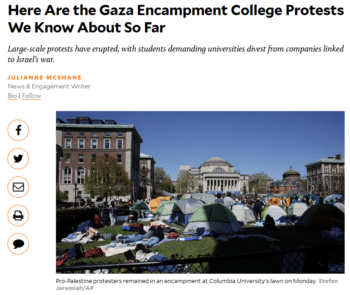
Mother Jones (4/22/24)
And right now, they’re speaking clearly to this country, not only about Palestine, and our need to get a ceasefire and to divest. Their demands are super clear. They’re super prepared. They’re super disciplined and intentional. I’m so proud of them. But not only are they making these demands clear for us in relation to Palestine, they’re also giving us, in plain sight, a contradiction for us to understand and grapple with domestically.
Do we want continued militarization of police, not only in our communities, but on our college campuses? This is what we’re witnessing: riot gear, dispersal techniques used on our students at Ivy League institutions, at non–Ivy League institutions. Literally, the weight of policing being levied against students from the ages of 17 to 20.
And it’s not only a concern that we’re seeing this, obviously, under a supposed Democratic, progressive president; we can see that this is something we should be concerned about, not only now, but in the future here for this country, as we see this intense militarization of our college campuses.
JJ: Let me just say, to me, on some level, the media’s focus on “leverage,” that focus on “Joe is kind of irked at Bibi. Uh oh”—it feels condescending to me, this Great Man theory of history that’s going on. It’s a personal conversation between Joe Biden and Netanyahu. It seems to make a mockery of international law and of human rights, frankly. And I just wonder, what other lenses could media be using? What other things could media be focusing on, that would take it away from “there’s a personal fight between these two guys, and somehow millions of people are affected by it.”
AA: Yeah, I think what media can do is continue to center the horrific nature of this Israeli assault, this genocidal assault on Gaza, the statistics, the data, the stories, the devastation that we’re seeing in Rafah right now. I think centering those voices and that experience, and then thinking about, again, our role, is where the focus needs to be.
The conversations between President Biden and Benjamin Netanyahu are for them to have. What we’re asking for is action. And we’re not going to be satisfied with these leaks of displeasure or of tension or of fracturing friendships. This isn’t about friendships. This is about stopping a genocide. And unfortunately, right now, not only are we not stopping it, we’re arming it and supporting it.
JJ: We’ve been speaking with Ahmad Abuznaid. He’s executive director at the U.S. Campaign for Palestinian Rights. Thank you so much, Ahmad Abuznaid, for joining us this week on CounterSpin.
AA: Thank you, Janine.

